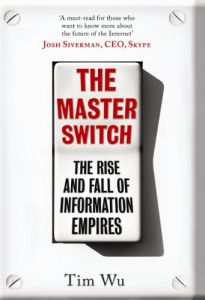Join getAbstract to access the summary!

Join getAbstract to access the summary!
Tim Wu
The Master Switch
The Rise and Fall of Information Empires
Knopf, 2010
What's inside?
Who will own the Internet?
Recommendation
Great advances in communications technology start new industries, but the history of such breakthroughs shows a cycle of fragmentation, concentration, more breakthroughs and a splintered set of small companies. The web may defy this cycle, whether control of the web consolidates or remain diffuse. Historic patterns suggest that today’s major web companies may become part of larger media empires, centralizing control of online content. Columbia professor Tim Wu offers a rich saga tracing the evolution of telecom industries, technology and regulations and explains what these patterns portend.
Summary
About the Author
Tim Wu is an author, a policy advocate and a professor at Columbia University.

















Comment on this summary
Where is the Internet? On public property. 90% of outside plant is on municipal property. The Internet is common carriage on public rights of way.